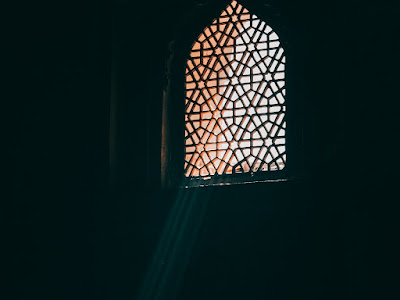وَجَّهْتُ وَجْهِيَ لِلَّذِي فَطَرَ السَّمَاوَاتِ وَالأَرْضَ، حَنِيفًا مُسْلِمًا وَمَاأَنَامِنَ الْمُشْرِكِينَ، إنّ صَلَاتِي وَنُسُكِي وَمَحْيَايَ ومَمَاتِي لِلهِ رَبِّ الْعَالَمِينَ، لَا شَرِيكَ لَهُ وَبِذَلِكَ أُمِرْتُ وَأَنَا مِنَ الْمُسْلِمِينَ
Sunan Ibn Majah Book: 26, Hadith: 3240
حَدَّثَنَا هِشَامُ بْنُ عَمَّارٍ، حَدَّثَنَا إِسْمَاعِيلُ بْنُ عَيَّاشٍ، حَدَّثَنَا مُحَمَّدُ بْنُ إِسْحَاقَ، عَنْ يَزِيدَ بْنِ أَبِي حَبِيبٍ، عَنْ أَبِي عَيَّاشٍ الزُّرَقِيِّ، عَنْ جَابِرِ بْنِ عَبْدِ اللَّهِ، قَالَ ضَحَّى رَسُولُ اللَّهِ ـ صلى الله عليه وسلم ـ يَوْمَ عِيدٍ بِكَبْشَيْنِ فَقَالَ حِينَ وَجَّهَهُمَا " إِنِّي وَجَّهْتُ وَجْهِيَ لِلَّذِي فَطَرَ السَّمَوَاتِ وَالأَرْضَ حَنِيفًا وَمَا أَنَا مِنَ الْمُشْرِكِينَ إِنَّ صَلاَتِي وَنُسُكِي وَمَحْيَاىَ وَمَمَاتِي لِلَّهِ رَبِّ الْعَالَمِينَ لاَ شَرِيكَ لَهُ وَبِذَلِكَ أُمِرْتُ وَأَنَا أَوَّلُ الْمُسْلِمِينَ اللَّهُمَّ مِنْكَ وَلَكَ عَنْ مُحَمَّدٍ وَأُمَّتِهِ
It was narrated that Jabir bin ‘Abdullah said: “The Messenger of Allah (ﷺ) sacrificed two rams on the Day of ‘Eid. When he turned them to face towards the prayer direction he said: ‘Verily, I have turned my face towards Him Who has created the heavens and the earth, as a monotheist, and I am not of the polytheists. Verily, my prayer, my sacrifice, my living, and my dying are for Allah, the Lord of all that exists. He has no partner. And of this I have been commanded, and I am the first of the Muslims. [6:79,162-163] O Allah, from You to You, on behalf of Muhammad and his nation.’”

Comments
Post a Comment
Please express your feedback and reviews by leaving comments.